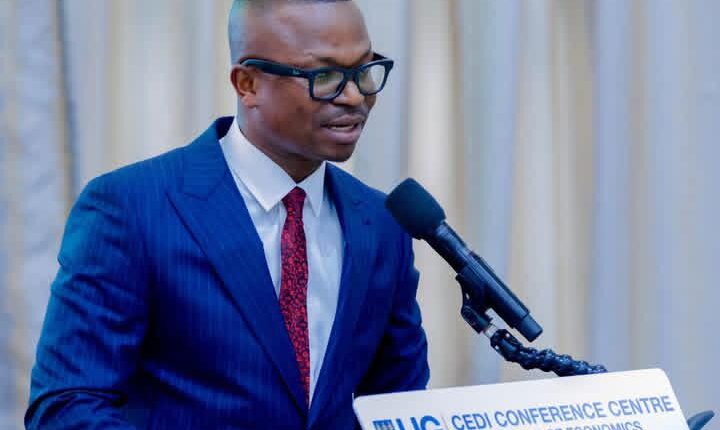The Chief Executive of the National Entrepreneurship and Innovation Programme (NEIP), Mr. Eric Adjei has admonished the 10, 000 beneficiaries selected for the first batch of the ‘Adwumawura’ programme to approach the opportunity given them with discipline, honesty, and commitment.
He asked the beneficiaries to embrace with focus and stewardship, reminding them that the journey ahead would not be without challenges.
“I urge all of you here to stay resilient and committed and not disappoint. Remember the purpose, remember why you are here and remember what is ahead. Do not lose that focus. No business, no matter how successful, is free from challenges. What will set you apart is how you rise above them and continue to innovate” he made this known at the matriculation and onboarding ceremony held at the Cedi Conference Room of the University of Ghana last Thursday, describing the initiative as a defining moment in the nation’s economic transformation agenda.
He continued, “As we begin, let me first acknowledge The Almighty God for granting us the grace to witness this occasion. Let me also recognize the leadership of His Excellency the President, John Dramani Mahama, whose vision of an inclusive and resilient economy is at the core of this programme. The programme aligns with the vision of the President, whose strategic focus on inclusive economic growth, and youth empowerment underpins this initiative.
“Ladies and Gentlemen, the importance of entrepreneurship to Ghana’s economy cannot be overstated. In an era of rapid technological change, economic diversification, and global competition, the ability of our youth to create and upscale businesses is critical to our national development. The Adwumawura programme is designed to create a resilient entrepreneurial ecosystem that nurtures innovation, facilitates access to funding, provides mentorship, and ensures market integration. By doing so, it addresses unemployment, drives economic growth, and builds self-reliance at both individual and community levels.”
The programme, a flagship project under the National Entrepreneurship and Innovation Programme (NEIP) and operating within the newly established Ministry of Youth Development and Empowerment, is designed to assist Ghanaians aged 18 to 35 with technical, vocational and entrepreneurial skills to start and expand their businesses.
The matriculation and onboarding ceremony for the 2025 cohort was attended by several high-profile dignitaries, including the Vice-President, Prof. Naana Jane Opoku-Agyemang; staff from her office; the Minister of Food and Agriculture, Eric Opoku; the Minister of Youth Development and Empowerment, George Opare-Addo; the Member of Parliament for Ayawaso West Wuogon and Deputy Minister of Food and Agriculture, John Dumelo; the Pro-Vice-Chancellor of the University of Ghana, Prof. Felix Ankomah Asante; the MP for Ablekuma North and Board Member of NEIP, Ewurabena Aubynn, the Country Director of the British Council, Nii Doodo Doodo, among others.
Explaining how the selection process was conducted to make way for the 10, 000 beneficiaries selected out of the 120, 000 applications that came through since the launch of the initiative in Kumasi in April this year, he indicated, “following the programme’s launch in April, NEIP engaged extensively with stakeholders to ensure that the initiative is practical, sustainable, and impactful. This included government agencies, who provided regulatory and policy guidance; financial institutions, who established mechanisms to enhance access to funding, ecosystem actors, including incubators, accelerators, private sector partners, and development organizations, who offered useful insights in shaping the programme.
“Let me indicate that, NEIP through our partnership with the British Council have engaged the University Hubs who are here with us today. The university innovations hubs would play a key role in providing comprehensive entrepreneurship training for our beneficiaries. Other private innovation hubs such as the Ghana Hubs Network, Chamber of Young Entrepreneurs and Association of Ghana startups have also been instrumental and will help provide entrepreneurship training to the selected beneficiaries.
He added, “Ladies and gentlemen, the selection of beneficiaries for this first cohort was conducted through a rigorous, transparent process overseen by a Selection Committee drawn from the British Council, Ghana Hubs Network, MASLOC, GEA, Ministry of Finance, Ministry of Youth Development and Empowerment, private sector, and management of NEIP. The criteria for selecting the beneficiaries were comprehensive and designed to ensure that the programme supports ventures with the highest potential for impact. These criteria included Job Creation Potential, Social Impact, Innovation, Scalability, Sustainability, Proposal Quality, and Environmental, Social, and Governance (ESG) Standards. Both ideation-stage and existing businesses were evaluated to ensure a balance between nurturing new ideas and upscaling established enterprises. From over 120,000 applications of young men and women received from across all regions of Ghana, a total of 10,000 beneficiaries were selected for this first cohort, a number that reflects the high demand for entrepreneurship support and the programme’s capacity to deliver quality interventions.”
“To facilitate training and capacity building, NEIP has partnered with 120 hubs and training partners distributed strategically across the country. These hubs serve as regional centers for mentorship, incubation, and practical training. The training manual, developed collaboratively with industry experts and partner institutions, is structured to provide both theoretical knowledge and practical application. The modules include business planning, financial literacy, marketing and branding, digital skills, operational management, ESG compliance, customer service excellence, and sustainable business practices.
The programme’s success hinges on the active engagement of hubs, trainers, and partners. These institutions are responsible for delivering technical content, mentoring entrepreneurs, and ensuring adherence to the training manual and programme standards. Trainers will also provide real-world insights, challenge conventional thinking, and instill resilience, adaptability, and problem-solving skills among beneficiaries.”
He concluded his speech by extending “deepest gratitude to our partners, government agencies, financial institutions, development partners, and ecosystem actors whose collaboration and dedication have made this programme possible. Together, we are building a resilient, structured, and measurable framework for entrepreneurial success that will contribute meaningfully to the President’s vision for a thriving, inclusive, and resilient Ghanaian economy.”



Comments are closed.